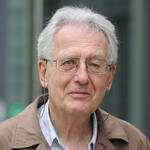Klaus Rajewsky honored for a lifetime of achievements
It all started with twelve rabbit cages in Cologne – and a position as a stand-in for a scientific assistant. In 1964, at the age of 27, Klaus Rajewsky arrived at the newly established Institute for Genetics, founded by Max Delbrück, after studying medicine in Frankfurt and Munich and spending two years conducting research in Paris. His primary tasks were to produce antibodies in rabbits and to secure funding for his own studies. “I was the only immunologist there, and the others seemed to find my antibodies useful,” Professsor Rajewsky recalls.
By the time he left the University of Cologne 38 years later to join Harvard Medical School in Boston – sidestepping mandatory retirement in Germany – his department had become the institute’s largest and was internationally recognized among immunologists and molecular biologists. Since 2011, the 88-year-old Rajewsky has headed the Immunoregulation and Cancer research group at the Max Delbrück Center. His career spans more than six decades, during which he uncovered many of the genetic mechanisms that govern the immune system and contribute to disease.
The European Federation of Immunological Societies (EFIS) is now recognizing Rajewsky’s life’s work. To mark its 50th anniversary, EFIS – the umbrella organization of 26 national immunology societies across Europe – is awarding its first Lifetime Achievement Award. Rajewsky is being honored a pioneer in the field of cellular and molecular immunology.
“Groundbreaking research, transformative innovations”
“When I learned about the award, it was a very moving moment for me,” Rajewsky says. “EFIS is a large community of immunologists – and the fact that they chose me, someone who started out so small, for their first Lifetime Achievement Award is really wonderful.” He received the award on August 17, 2025, in Vienna during the Congress of the International Union of Immunological Societies.
Rajewsky was nominated by the German Society for Immunology (DGfI), which he co-founded in 1967. EFIS cited his groundbreaking research, transformative innovations, and his mentorship of generations of immunologists as reasons for the award. It highlighted his foundational work on antibody-producing B cells and the development of a gene-targeting system that for the first time allowed researchers to switch individual genes on or off in specific tissues or at specific times. “Traditional gene targeting, by contrast, would alter all cells in the organism,” Rajewsky explains. Researchers from around the world came to his lab in Cologne to learn this CRE/loxP-based method.
EFIS also praised Rajewsky for adopting and refining cutting-edge technologies such as microRNA analysis and the CRISPR/Cas9 gene-editing tool early on in immunological research. Just three years ago, his team published a modified version of CRISPR/Cas9 in the journal Science Advances that offers significantly greater precision than earlier versions – potentially making it especially well-suited for correcting genetic diseases caused by a single mutation.
Still much to do
The publication is just one among a long list of scientific papers to which Rajewsky has contributed – more than 500, by his estimate. Together with colleagues and a pathologist, he was also the first to identify that the previously mysterious Hodgkin lymphoma arises from B cells at a specific developmental stage. Rajewsky “has been a tireless promoter of collaborative science and international exchange,” EFIS said in a statement about the award. “As a mentor, he has trained and inspired generations of immunologists in Germany, across Europe, and internationally.”
His work is far from over. “Right now, we’re looking at certain inherited immunodeficiencies in which T cells don’t function properly,” he says. These cells can be genetically repaired. Rajewsky and his current ten-person team have shown in mouse models that the animals can be cured of these deadly inherited conditions. Their experiments with human cells have also been successful. “These are very rare conditions in humans, though – which makes it difficult to secure funding for clinical trials,” Rajewsky notes. But perhaps the wealth of experience he has collected over his 60-year career will help him to ultimately move this research forward.
Text: Anke Brodmerkel
Further information
Contact
Prof. Dr. Klaus Rajewsky
Group Leader, Immune regulation und Cancer
Max Delbrück Center
+49 30 9406-2391
klaus.rajewsky@mdc-berlin.de or riikka.lauhkonen@mdc-berlin.de
Gunjan Sinha
Editor, Communications
Max Delbrück Center
+49 30 9406-2118
gunjan.sinha@mdc-berlin.de or presse@mdc-berlin.de
- Max Delbrück Center
-
The Max Delbrück Center for Molecular Medicine in the Helmholtz Association lays the foundation for the medicine of tomorrow through our discoveries of today. At locations in Berlin-Buch, Berlin-Mitte, Heidelberg, and Mannheim, interdisciplinary teams investigate the complexity of disease at the systems level – from molecules and cells to organs and entire organisms. Together with academic, clinical, and industry partners, and as part of global networks, we turn biological insights into innovations for early detection, personalized therapies, and disease prevention. Founded in 1992, the Max Delbrück Center is home to a vibrant, international research community of around 1,800 people from over 70 countries. We are 90 percent funded by the German federal government and 10 percent by the state of Berlin.







